Monitoring my .NET app in Performance Monitor I can see the .NET CLR LocksAndThreads / # of current logical Threads is increasing steadily (currently 293) over time which indicates the thread stack is leaking.
I can find many articles which tell me this is the problem but nothing that tells me how to find the cause - so where do I start? Can Windbg tell me where the problem lies?
This is my performance monitor over 3hrs telling my current logical threads is 150:

And this is the output of the threads window, which doesn't tell me much because I can't access their call stacks - they are mostly marked as [unavailable] or [In a sleep, wait or join] | [External Code]:
Unflagged 141024 124 Worker Thread <No Name> Normal
Unflagged > 0 0 Unknown Thread [Thread Destroyed]
Unflagged 136272 2 Worker Thread <No Name> Highest
Unflagged 133060 7 Worker Thread vshost.RunParkingWindow [Managed to Native Transition] Normal
Unflagged 136952 10 Main Thread Main Thread [edited].Program.Main Normal
Unflagged 134544 9 Worker Thread .NET SystemEvents [Managed to Native Transition] Normal
Unflagged 136556 11 Worker Thread Worker Thread [edited].MessageService.ProcessJobs.AnonymousMethod__0 Normal
Unflagged 141364 113 Worker Thread <No Name> [In a sleep, wait, or join] Normal
Unflagged 140896 0 Worker Thread [Thread Destroyed] Normal
Unflagged 136776 19 Worker Thread <No Name> [In a sleep, wait, or join] Normal
Unflagged 135704 20 Worker Thread <No Name> [In a sleep, wait, or join] Normal
Unflagged 136712 21 Worker Thread <No Name> [In a sleep, wait, or join] Normal
Unflagged 134984 22 Worker Thread <No Name> [In a sleep, wait, or join] Normal
Unflagged 134660 23 Worker Thread Worker Thread [edited].BroadcastService.ProcessJobs.AnonymousMethod__1d Normal
Unflagged 140224 152 Worker Thread <No Name> Normal
Unflagged 140792 157 Worker Thread <No Name> Normal
Unflagged 137116 0 Worker Thread <No Name> Normal
Unflagged 140776 111 Worker Thread <No Name> Normal
Unflagged 140784 0 Worker Thread [Thread Destroyed] Normal
Unflagged 140068 145 Worker Thread <No Name> Normal
Unflagged 139000 150 Worker Thread <No Name> Normal
Unflagged 140828 52 Worker Thread <No Name> Normal
Unflagged 137752 146 Worker Thread <No Name> Normal
Unflagged 140868 151 Worker Thread <No Name> Normal
Unflagged 141324 139 Worker Thread <No Name> Normal
Unflagged 140168 154 Worker Thread <No Name> Normal
Unflagged 141848 0 Worker Thread [Thread Destroyed] Normal
Unflagged 135544 153 Worker Thread <No Name> Normal
Unflagged 142260 140 Worker Thread <No Name> Normal
Unflagged 141528 142 Worker Thread <No Name> [In a sleep, wait, or join] Normal
Unflagged 141344 0 Worker Thread [Thread Destroyed] Normal
Unflagged 140096 136 Worker Thread <No Name> Normal
Unflagged 141712 134 Worker Thread <No Name> Normal
Unflagged 141688 147 Worker Thread <No Name> Normal
Update: I've since tracked the culprit down to a System.Timers.Timer. Even when this timer called an empty method on each Elapsed event it still raised the logical thread count indefinitely. Just changing the timer to a DispatcherTimer has fixed the problem.
I started looking into all the timers in my application after seeing a large number when running !dumpheap -type TimerCallback in Windbg as mentioned in this question.
I'd still like to know how I could've detected this via Windbg debugging rather than the disable timers/check performance/repeat method that lead me to the fix. I.e. anything that could've told me which timer was creating the problem.